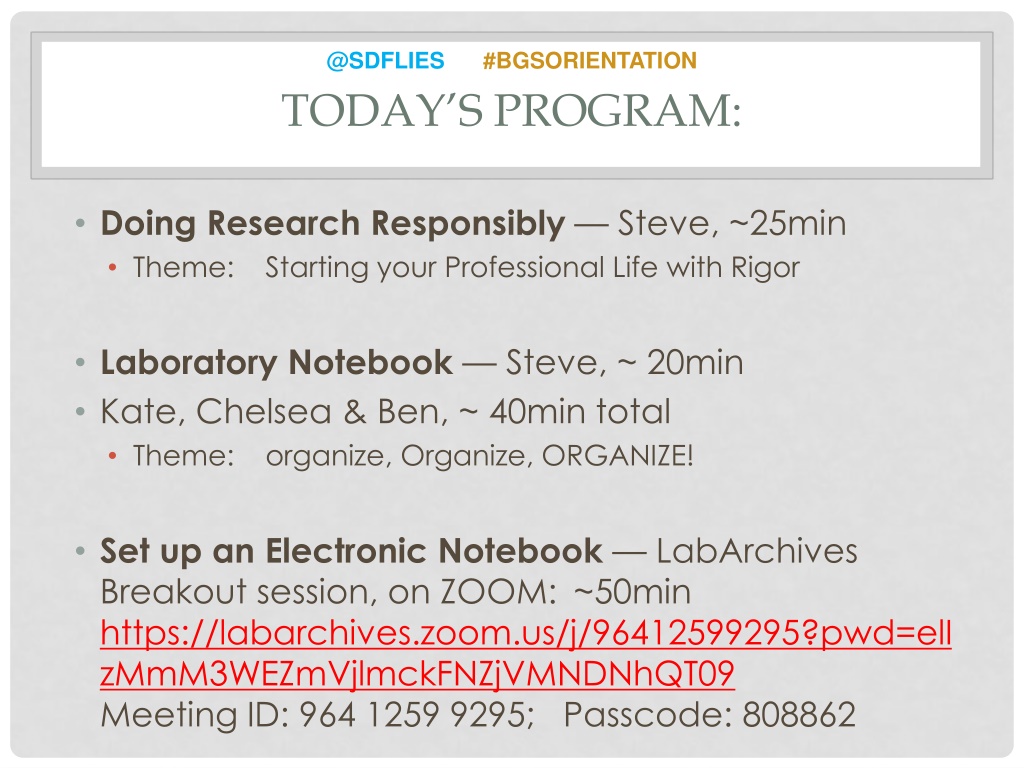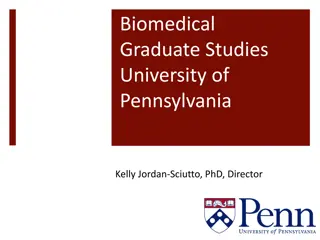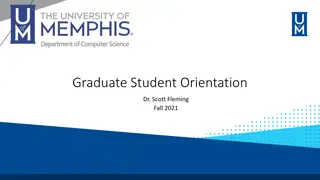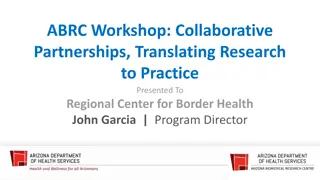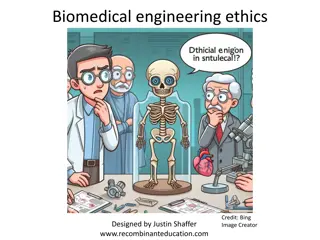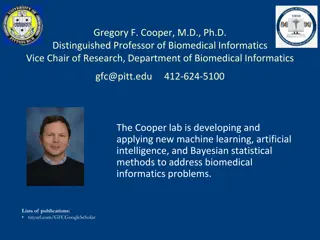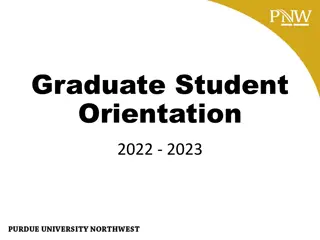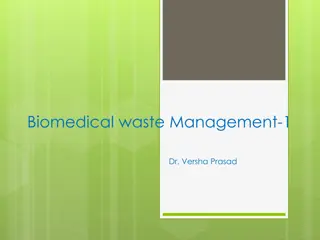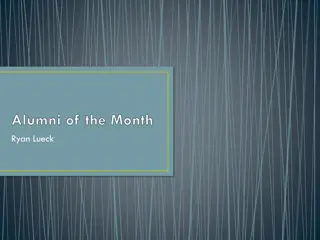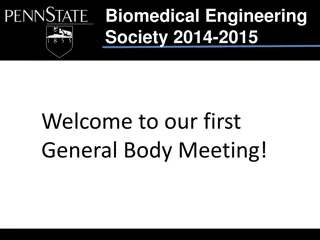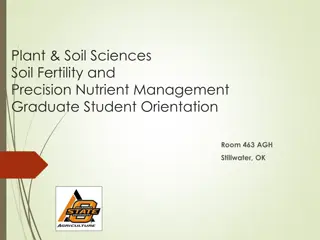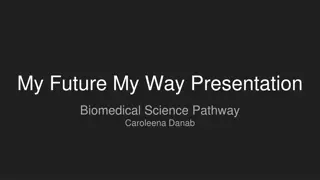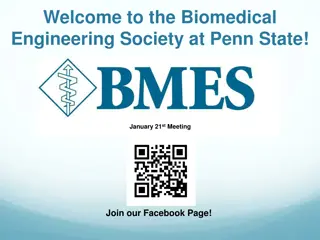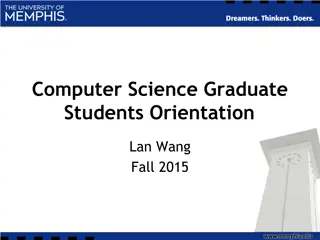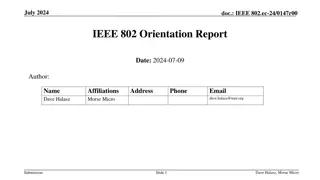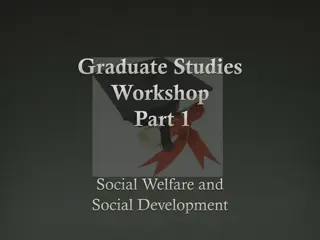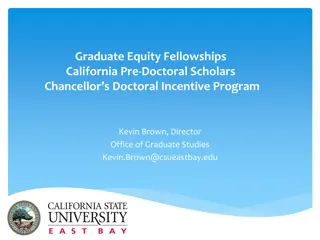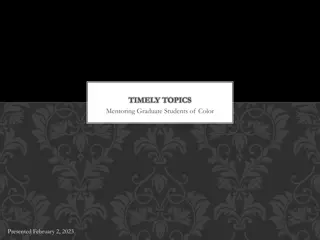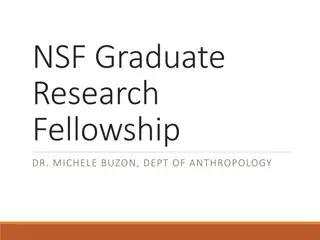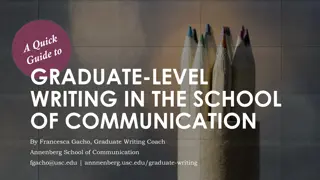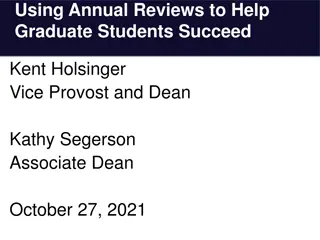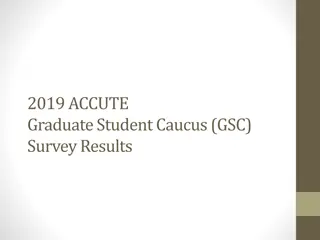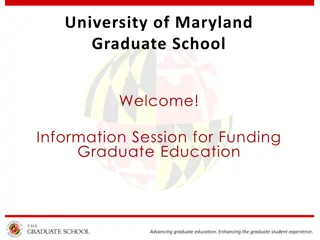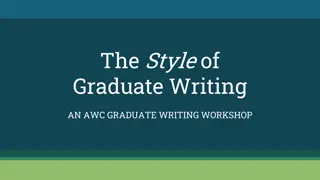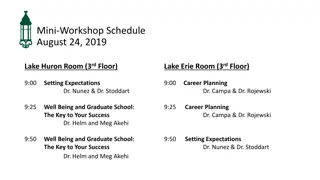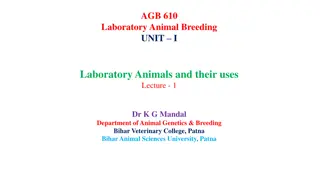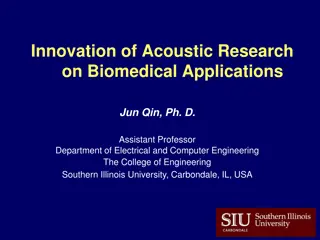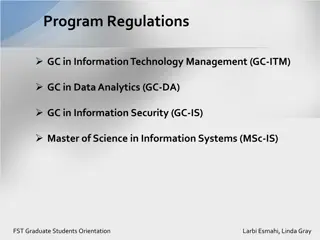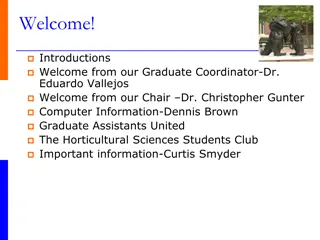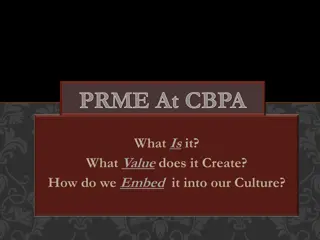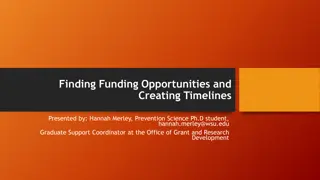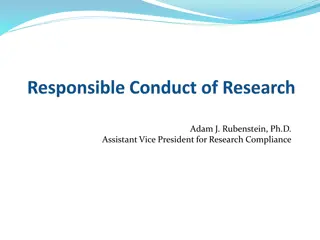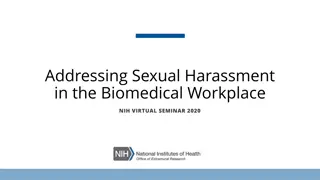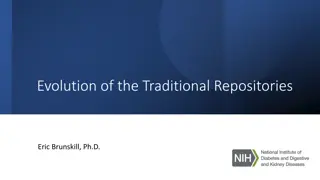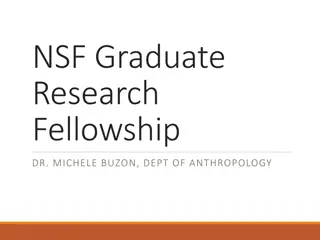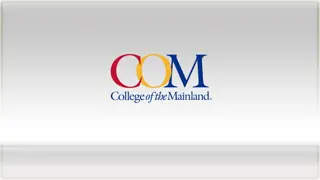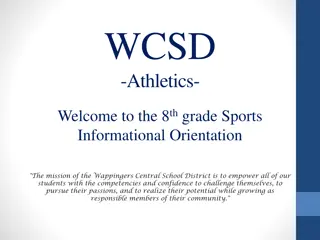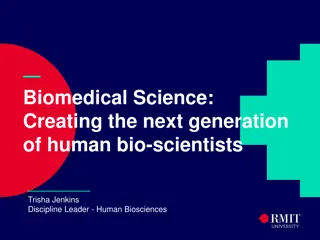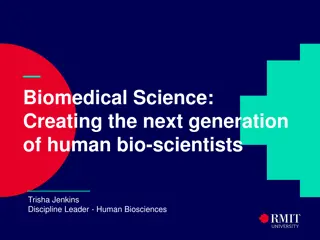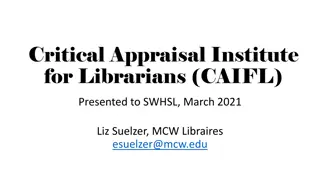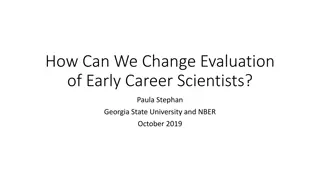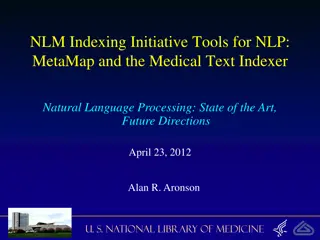Responsible Research Practices for Biomedical Graduate Studies Orientation
Learn about responsible research practices and setting up an electronic notebook at the Biomedical Graduate Studies Orientation event. Sessions focus on conducting research with rigor, organizing laboratory notebooks, and essential qualities like honesty, accuracy, efficiency, and objectivity.
Download Presentation

Please find below an Image/Link to download the presentation.
The content on the website is provided AS IS for your information and personal use only. It may not be sold, licensed, or shared on other websites without obtaining consent from the author. Download presentation by click this link. If you encounter any issues during the download, it is possible that the publisher has removed the file from their server.
E N D
Presentation Transcript
@SDFLIES TODAY S PROGRAM: #BGSORIENTATION Doing Research Responsibly Steve, ~25min Theme: Starting your Professional Life with Rigor Laboratory Notebook Steve, ~ 20min Kate, Chelsea & Ben, ~ 40min total Theme: organize, Organize, ORGANIZE! Set up an Electronic Notebook LabArchives Breakout session, on ZOOM: ~50min https://labarchives.zoom.us/j/96412599295?pwd=elI zMmM3WEZmVjlmckFNZjVMNDNhQT09 Meeting ID: 964 1259 9295; Passcode: 808862
RESPONSIBLE CONDUCT OF RESEARCH (RCR) BIOMEDICAL GRADUATE STUDIES Steve DiNardo Director, Training Support and Career Development, BGS @SDFLIES #BGSORIENTATION
WHAT IS YOUR PRIMARY GOAL? pause DO GOOD SCIENCE KNOW HOW TO IDENTIFY GOOD SCIENCE HELP OTHERS IDENTIFY AND DO GOOD SCIENCE All, as you CREATE YOUR PROFESSIONAL SELF !
WHAT IS YOUR PRIMARY GOAL? TO DO GOOD SCIENCE Must stand on the shoulders of others who came before MUST IDENTIFY GOOD SCIENCE How to pick the right shoulders? The science that came before was done: Responsibly Reproducibly & with Rigor! RCR training provides you with tools. https://blog.yorksj.ac.uk/moodle/files/2014/05/LAWW.jpg
WHAT IS YOUR PRIMARY GOAL? DO GOOD SCIENCE Standing on the shoulders of others who came before: BY CREATING YOUR PROFESSIONAL SELF : You become those shoulders to stand on! You are here The science you do must be done: Responsibly Reproducibly & with Rigor!
WHAT ESSENTIAL QUALITIES SHOULD YOU STRIVE FOR? HONESTY conveying information truthfully and honoring commitments ACCURACY reporting findings precisely and taking care to avoid errors EFFICIENCY using resources wisely and avoiding waste, and OBJECTIVITY letting the facts speak for themselves and avoiding improper bias.
THOSE ARE THE QUALITIES NEEDED TO: RESPONSIBLY CONDUCT RESEARCH (RCR) T H E I D E A S A R E N O T D I F F I C U L T T O F A T H O M ; B U T T H E Y N E E D T O B E M A D E E X P L I C I T
AREAS THAT REQUIRE RESPONSIBLE CONDUCT Laboratory Notebooks Rigor in Experiment Design Acquisition and Management of Data Collaborative Science Conflicts of Interest and Time Mentoring Peer Review Research Misconduct Responsible Authorship and Publication Scientists as Responsible Members of Society Use of Animals in Research Use of Humans in Research ETHICALQUESTIONS CAN WILL ARISE IN THESE SUBJECT AREAS
TRAINING IN RCR Your training in RCR is continual. Why? See concepts several times; In different contexts = they are sticky ! On-line instruction in Years 1 4 ( Knowledgelink ) Workshops based on Case Studies in Years 2 4 RCR-focused lab meetings in Years 3 5
CASE STUDIES You will read Case Studies often You had a great intro to Case Studies yesterday On Mentorship These are a source for discussion In small groups to promote comfortable discussion Each group has a facilitator One who guides, not lectures (for some topics) there will be no perfect answer
HONESTY conveying information truthfully and honoring commitments ACCURACY reporting findings precisely and taking care to avoid errors EFFICIENCY using resources wisely and avoiding waste, and OBJECTIVITY letting the facts speak for themselves and avoiding improper bias. APPLY THOSE ESSENTIAL QUALITIES IN CONSIDERING CASE STUDIES
EXAMPLE CASE STUDY Mike is a 4th-year student. His work is progressing well, however some data aren t falling into place. Specifically a few control experiments he knows should work are not working. He doesn t want to bother his thesis advisor or thesis committee with what he thinks is a minor detail, so he has not asked for advice or help. (continued)
CASE STUDY, CONTINUED Perhaps because he expects them to work soon, or because he does not want to ruin what s really a pretty nice story, Mike, when asked about the controls at a lab meeting says, no worries, I ve done them; they were as expected . (Honesty, Accuracy, Efficiency, Objectivity) How do you rate Mike? pause
CASE STUDY, CONTINUED His advisor is happy that everything is in place, and asks that the experiments be included in a poster Mike is preparing for a meeting. Mike does so, without the nonexistent controls. At the meeting, Mike intentionally steers discussion at his poster away from any consideration of controls. pause And, now? Honesty, Accuracy, Efficiency, Objectivity
CASE STUDY, CONTINUED When Mike returns to lab, he finds that his advisor has incorporated his data into a manuscript just submitted to a journal, with the controls mentioned in the text. We ve focused on Mike What about his PI? What is/was their role? pause
WHICH AREA(S) DOES THIS CASE STUDY HIGHLIGHT? Acquisition and Management of Data Collaborative Science Conflicts of Interest and Time Mentoring Peer Review Research Misconduct Responsible Authorship and Publication Scientists as Responsible Members of Society Use of Animals in Research Use of Humans in Research
RESEARCH MISCONDUCT A definition: Fabrication, falsification, plagiarism, or other serious deviation from accepted practices in Proposing Performing Reviewing Reporting research or research results.
THE GOAL OF YOUR RCR TRAINING: Acquisition and Management of Data Collaborative Science Conflicts of Interest and Time Mentoring Peer Review Research Misconduct Responsible Authorship and Publication Scientists as Responsible Members of Society Use of Animals in Research Use of Humans in Research Provide you with tools to anticipate matters arising in these areas
RCR WILL BE CONTINUAL DURING YOUR TIME HERE On-line instruction in Years 1 4 ( Knowledgelink ) Workshops based on Case studies in Years 2 4 Year 2: Research misconduct and data management Year 3: Mentor/mentee relationships, collaborative science, animal and human subjects Year 4: Conflict of interest, responsible authorship/ publication, peer review RCR-focused lab meetings in Years 3 5 BGS has a phenomenal Resource for you
BGS RCR/SRR WEBSITE http://bit.ly/BGS_RCR_UPENN
NIH RCR RESOURCES http://bit.ly/NIH_RCR
TO SUM UP: THESE ARE YOUR QUALITIES HONESTY conveying information truthfully and honoring commitments, ACCURACY reporting findings precisely and taking care to avoid errors, EFFICIENCY using resources wisely and avoiding waste, and OBJECTIVITY letting the facts speak for themselves and avoiding improper bias.
WHAT IS YOUR PRIMARY GOAL? CREATING YOUR PROFESSIONAL SELF : Be the right shoulders to stand on! Be here By carrying out your science: Responsibly Reproducibly & with Rigor!
TRAINING IN SCIENTIFIC RIGOR AND REPRODUCIBILITY (SRR) SRR is related to the ethical conduct of research (RCR). Rigorous Experimental Design; Authenticate Reagents; Transparency in your Protocols. **Thursday, 8/27 Kurt Engleka: Ready, Set, Experiment! Your training in SRR will: Be continuous Use complementary mechanisms (different Contexts ): BGS Courses (Year 1 & beyond): integrated within courses Workshop(Year 2): Resource & Reagent Authentication Candidacy exam (Year 2); expected throughout your proposal Experimental design-focused lab meetings (Years 3- 5)
@SDFLIES #BGSORIENTATION TODAY S PROGRAM: Doing Research Responsibly Steve, ~25min Theme: Starting your Professional Life with Rigor Laboratory Notebook Steve, ~ 20min Kate, Chelsea & Ben, ~ 40min total Theme: organize, Organize, ORGANIZE! Set up an Electronic Notebook LabArchives Breakout session, on ZOOM: ~50min https://labarchives.zoom.us/j/96412599295?pwd=elI zMmM3WEZmVjlmckFNZjVMNDNhQT09 Meeting ID: 964 1259 9295; Passcode: 808862
